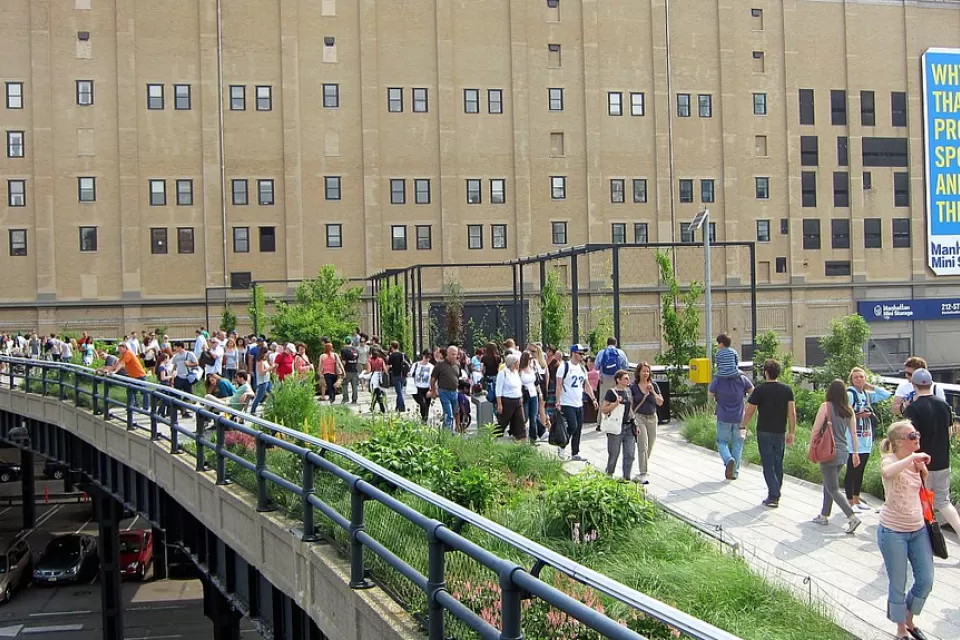The Daily Source of Urban Planning News
How Flexible Parking Requirements Spur Economic Development
A UCLA master's student and Don Shoup found that Santa Monica, CA's flexible parking requirements have led to significant fiscal and urban form benefits. A sample of parcels showed eight-times more sales tax revenue per sq. ft. than a control group.
America's Best Urban Bike Paths
Mark Lebetkin highlights 19 of the best bike paths to be found in America's cities. From San Deigo to Boston, the paths were chosen for their beauty, accessibility, and functionality.
Should Electric Cars Get Free Parking?
Ideally, the best way to encourage sales of non-polluting electric vehicles would be to price carbon emissions. But if that isn't possible, why not reward EV owners with perks such as free parking; or would that be a distortionary incentive?
San Francisco Aims to Tame Techie Transit
Tired of the private shuttles ferrying tech workers to Silicon Valley campuses clogging city streets and illegally using 250 city bus stops, San Francisco's Municipal Transportation Agency has proposed a plan for regulating their operation.
Millennials Not Ready to Leave Mom's Basement
During the Great Recession, household formation in the U.S. was well below historic levels, dimming the demand for new homes. Although many sectors of the economy have experienced sustained recoveries, household growth still lags.
America's Rail Station Renaissance
The latter half of the twentieth century saw the slow decline of train travel and the deterioration of America's grand railroad stations. Amid growing rail readership, the country is embarking on a new era of station construction.
Can Algorithms Expedite the Activation of Vacant Properties?
With thousands of abandoned homes located in neighborhoods of varying shape and character, Chicago has a massive challenge in returning its vacant properties to active use. Can algorithms help leaders decide on the right solutions?
How Neighborhood Improvement Can Prevent Gentrification
Rick Jacobus looks for a way out of gentrification paralysis, and suggests that incremental improvements to lower-income neighborhoods can be a bulwark against broad displacement.

Why Don't We Allow Designers to Create Cites for People?
Cars kill us and drive us crazy; while walking and biking improve our mental and physical health. So why do we design our cities for cars, asks Jeffrey Tumlin.

New Study: More Urban = More Safe
A new study by researchers at Children's and the University of Pennsylvania concludes that, contrary to popular perception, cities are safer than rural or suburban areas. Higher rates of fatal car accidents outside cities are largely to blame.
Mass. Gas Tax Hike Bill Vetoed: Not Big Enough!
In an unusual move for governors loath to increase gas taxes, Mass. Governor Deval Patrick vetoed a bill not because it would raise and index gas taxes by three cents, but because the increase may not be big enough if Rt. 90 tolls are eliminated.
With Temporary Parklets, Toronto Plays Long Game in Taking Back City's Streets
With the installation of new parklets along Church Street in Toronto's Gay Village, the city is embracing a rethink of how its public spaces are used. While the elimination of parking spots may be heresy to many, Christopher Hume welcomes the change.

The High Line Highway
One of Manhattan's most popular tourist attractions, the linear, elevated urban park that existed as a freight rail line as late as 1980, is also a means of commuting to work - but only for walkers as cycling is prohibited along the High Line.
'Teardown Enforcer' Eases Mansionization of Minneapolis Suburb
In an affluent suburb of Minneapolis, Minnesota's first 'residential redevelopment coordinator' works as a buffer between aggressive builders and residents upset about the side effects of mansionization.
Do the Feds Have a Responsibility to Help Detroit?
The federal government has a role to play in the financial crises afflicting cities across America, and most notably of late, in Detroit. Should Washington also play a role in helping them to recover?
London's Dubious Olympic Legacy
A year after the city staged an Olympic games intended to provide a legacy of revitalization for East London, Oliver Wainwright checks in on the progress. While the early results are 'not auspicious', he still finds reason for optimism.
'Gentrification Overdrive' on 14 Street Symbolizes D.C.'s Gilded Age
In D.C.'s newly-crowned densest area, apartment rents average $2,700 a month, cocktails cost $16, and it's tough to get a table on a Tuesday night. 14th Street's rapid renewal, emblematic of the city's recession-era boom, has some residents chafing.
America's Geography of Opportunity
A new study presents the 'most detailed portrait yet' of the places in America where opportunities for, and obstacles to, upward mobility abound. The Southeast and industrial Midwest are the most difficult places to rise out of poverty.
How Will Bike-Centric Urbanism Reshape Our Cities?
For the past half-century, the automobile has played a profound role in shaping the form of our cities and suburbs. A new book examines the effects cycle-centric planning will have on the built environment.
What's Next for Bloomberg Admin's Star Planners?
Janette Sadik-Khan and Amanda Burden have been among the most visible proponents, and benefactors, of the progressive planning initiatives that've transformed New York City over the last decade. They'll take on the post-Bloomberg transition together.
Pagination
City of Charlotte
Municipality of Princeton
Roanoke Valley-Alleghany Regional Commission
City of Camden Redevelopment Agency
City of Astoria
Transportation Research & Education Center (TREC) at Portland State University
US High Speed Rail Association
City of Camden Redevelopment Agency
Municipality of Princeton (NJ)
Urban Design for Planners 1: Software Tools
This six-course series explores essential urban design concepts using open source software and equips planners with the tools they need to participate fully in the urban design process.
Planning for Universal Design
Learn the tools for implementing Universal Design in planning regulations.


































